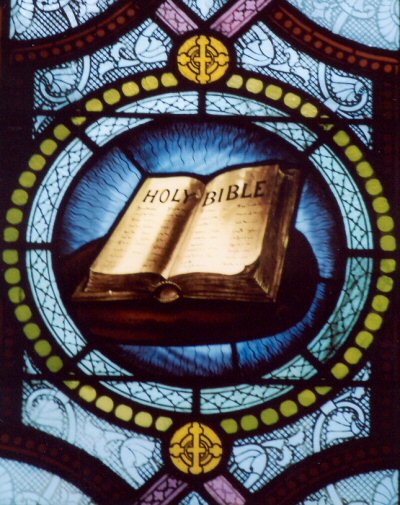
Liturgy of the Word
Fourth Sunday of Lent
March 30, 2014 Cycle A
Purple priestly vestments symbolize penance and preparation.
Home Page
Liturgical
Year Cycle A 13-14
Introductory Acts Of Worship
The Entrance Prayers:
On Sunday, usually a hymn praising God
is sung in place of reciting a Psalm from the Bible which invites us to
enter more deeply into the mystery of God's love for us. The recited
weekday Psalm expresses a youthful heart and spirit, delighted that we may come
before the living God.
Entrance Song
/ Entrance Psalm (Antiphon)
Entrance Song
Isaiah 66:10-11 Rejoice,
Jerusalem, and all who love her. Be joyful, all who were in mourning;
exult and be satisfied at her consoling breast.
The Priest Approaches and Kisses the Altar: The altar is a symbol of Christ. In it are cut five crosses to recall the five wounds of Christ. The altar also represents the Church and has embedded in it the relics of her saints. The priest comes to the altar to celebrate the Sacrifice in the Church's name. Because of the glory surrounding the altar upon which the divine Sacrifice will be made, the kiss of the priest unites the Church to Christ, its Redeemer.
Priest:
In the name of the Father, and of the Son, and of the Holy Spirit.
All:
Amen.
The Greeting: We are welcomed in God's name. Our response unites us to our neighbor, to the priest and to God. (The priest may select from several forms of greeting).
Priest: The Lord
be with you.
All:
And with your spirit.
The Penitential Prayers:
We recognize our guilt for past sins,
express our sorrow for them, and ask that Mary, the angels, the saints, and our
brothers and sisters in Christ pray for the Lord God's mercy. (The priest
may select from several forms).
Priest: Brothers and sisters, let us
acknowledge our sins, and so prepare ourselves to celebrate the sacred
mysteries.
Priest: You were sent to heal the contrite of heart: Lord, have mercy.
All: Lord, have mercy.
Priest: You came to call sinners: Christ, have mercy.
All: Christ, have mercy.
Priest: You are seated at the right hand of the Father to intercede
for us: Lord, have mercy.
All: Lord, have mercy.
The Absolution:
Priest: May almighty God have mercy on us, forgive us our sins, and
bring us to everlasting life.
All: Amen.
The Collect: The
priest lifts the united prayers and petitions of the congregation to God the
Father through the merits of Jesus Christ in the Holy Spirit.
Priest: O
God, who through your Word reconcile the human race to yourself in a wonderful
way, grant, we pray, that with prompt devotion and eager faith the Christian
people may hasten toward the solemn celebrations to come. Through our Lord
Jesus Christ, your Son, who lives and reigns with you in the unity of the holy
Spirit, one God, for ever and ever.

Liturgy of the Word
Christ is made known to us through the
Old Testament which prepares us to recognize Him. In those days, God
inspired men who spoke His message. Now, the New Testament Gospel reading
announces His presence to us directly through His Son. Both
readings bring God's message to us. Our responsibility is to respond.
The First Reading:
From the Old Testament
Priest/Reader: A reading from the
book of Samuel
First Reading: 1 Samuel 16:1b, 6-7, 10-13a
The Lord said to Samuel: “Fill your horn with oil, and be on your way. I am sending you to Jesse of Bethlehem, for I have chosen my king from among his sons.”
As Jesse and his sons came to the sacrifice, Samuel looked at Eliab and thought, “Surely the Lord’s anointed is here before him.” But the Lord said to Samuel: “Do not judge from his appearance or from his lofty stature, because I have rejected him. Not as man sees does God see, because man sees the appearance but the Lord looks into the heart.” In the same way Jesse presented seven sons before Samuel, but Samuel said to Jessie, “The Lord has not chosen any one of these.” Then Samuel asked Jesse, “Are these all the sons you have?” Jesse replied, “There is still the youngest, who is tending the sheep.” Samuel said to Jesse, “Send for him; we will not begin the sacrificial banquet until he arrives here.” Jesse sent and had the young man brought to them. He was ruddy, a youth handsome to behold and making a splendid appearance. The Lord said, “There – anoint him, for this is the one!” Then Samuel with the horn of oil in hand, anointed David in the presence of his brothers; and from that day on, the spirit of the Lord rushed upon David.
Priest/Reader:
The Word of the
Lord.
All:
Thanks
be to God.
The Responsorial Psalm:
This Psalm praising God, is a prayer to God,
or recommends the practice of virtue. It is sung as an interlude between
the scriptural readings. It provides yet another instructional setting and
invites the assembly to imitate the cantor who sings a repeated response to the
verses of an ancient Psalm many of which are attributed to King David. The
verses are sung first by a cantor (song leader) accompanied by instruments, the
refrain is sung by the people.
Psalm 21:1-3a, 3b-4, 5, 6
Cantor: The Lord is my shepherd, there is nothing I shall want.
All:
The Lord is my shepherd, there is nothing I shall want.
Cantor: The Lord is my shepherd; I shall not want.
In verdant pastures he gives me repose; by restful waters he leads me;
he
refreshes my soul.
All:
The Lord is my shepherd, there is nothing I shall want.
Cantor: He guides me in right paths for his name's sake.
Even though I walk in the dark valley I fear no evil; for you are at
my
side with your rod and your staff that give me courage.
All:
The Lord is my shepherd, there is nothing I shall want.
Cantor: You spread the table before me in the sight of my foes;
you anoint my head with oil; my cup over-flows.
All:
The Lord is my shepherd, there is nothing I shall want.
Cantor: Only goodness and kindness follow me all the days of my
life; and I shall dwell in the house of the Lord for years
to come.
All:
The Lord is my shepherd, there is nothing I shall want.
The Second Reading:
Taken from the New Testament, often from a
letter written by St. Paul.
Second Reading: Ephesians 5:8-14
Brothers and sisters: You were once darkness, but now you are light in the
Lord. Live as children of light, for light produces every kind of goodness and
righteousness and truth. Try to learn what is pleasing to the Lord. Take no
part in the fruitless works of darkness; rather expose them, for it is shameful
even to mention the things done by them in secret; but everything exposed by the
light becomes visible, for everything that becomes visible is light. Therefore,
it says: “Awake, O sleeper, and arise from the dead, and Christ will give you
light.”
The Alleluia: An ancient expression of joy anticipating the Lord's message we will hear in the Gospel.
John 8:12
Cantor: Praise to you, Lord Jesus Christ, king of endless
glory!
ALL: R/. Praise to you, Lord Jesus Christ, king of endless
glory!
Cantor: I am the light of the world, says the Lord;
whoever follows me will have the light of life.
ALL: R/. Praise to you, Lord Jesus Christ, king of endless
glory!
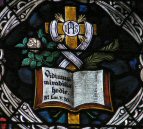 The Gospel:
The Liturgy of the Word is completed
by the reading of the Gospel. Before its reading, the members of the
assembly trace the sign of the cross upon the forehead to indicate their mental
acceptance of the Truth, on the lips to indicate their readiness to announce it,
and over the heart to indicate their sincere desire to accept it into their
lives. The "Good News" of the Gospel tells that God's kingdom has come for
all to hear, accept, and announce to the world for its salvation. It
is God who is speaking to us. Christ comes to teach us by the example of
His life and by His own words.
The Gospel:
The Liturgy of the Word is completed
by the reading of the Gospel. Before its reading, the members of the
assembly trace the sign of the cross upon the forehead to indicate their mental
acceptance of the Truth, on the lips to indicate their readiness to announce it,
and over the heart to indicate their sincere desire to accept it into their
lives. The "Good News" of the Gospel tells that God's kingdom has come for
all to hear, accept, and announce to the world for its salvation. It
is God who is speaking to us. Christ comes to teach us by the example of
His life and by His own words.
Priest: Cleanse my heart and my lips, almighty God, that I may worthily proclaim your
holy Gospel. Through the words of the Gospel may our sins be wiped away.
Priest: The Lord be with you.
All: And
also with you.
Priest/Deacon: A
reading from the holy Gospel according
to John.
All: Glory
to you, Lord.
The Gospel: John 9:1-41
John wrote to show that Christ was
the Messiah, the Divine Son of God.
 As Jesus passed by he saw
a man blind from birth. His disciples asked him, “Rabbi, who sinned, this man
or his parents, that he was born blind?” Jesus answered, “Neither he nor his
parents sinned; it is so that the works of God might be made visible through
him. We have to do the works of the one who sent me while it is day. Night is
coming when no one can work. While I am in the world, I am the light of the
world.” When he had said this, he spat on the ground and made clay with the
saliva, and smeared the clay on his eyes, and said to him, “Go wash in the Pool
of Siloam” – which means Sent –. So he went and washed, and came back able to
see.
As Jesus passed by he saw
a man blind from birth. His disciples asked him, “Rabbi, who sinned, this man
or his parents, that he was born blind?” Jesus answered, “Neither he nor his
parents sinned; it is so that the works of God might be made visible through
him. We have to do the works of the one who sent me while it is day. Night is
coming when no one can work. While I am in the world, I am the light of the
world.” When he had said this, he spat on the ground and made clay with the
saliva, and smeared the clay on his eyes, and said to him, “Go wash in the Pool
of Siloam” – which means Sent –. So he went and washed, and came back able to
see.
His neighbors and those who had seen him earlier as a beggar said, “Isn’t this the one who used to sit and beg?” Some said, “It is,” but others said, “No, he just looks like him.” He said, “I am.” So they said to him, “How were your eyes opened?” He replied, “The man called Jesus made clay and anointed my eyes and told me, ‘Go to Siloam and wash.’ So I went there and washed and was able to see.” And they said to him, “Where is he?” He said “I don’t know.”
They brought the one who was once blind to the Pharisees. Now Jesus had made clay and opened his eyes on a Sabbath. So then the Pharisees also asked him how he was able to see. He said to them, “He put clay on my eyes, and I washed, and now I can see.” So some of the Pharisees said, “This man is not from God, because he does not keep the Sabbath.” But others said, “How can a sinful man do such signs?” And there was a division among them. So they said to the blind man again, “What do you have to say about him, since he opened your eyes?” He said, “He is a prophet.”
Now the Jews did not believe that he had been blind and gained his sight until they summoned the parents of the one who had gained his sight. They asked them, “Is this your son, who you say was born blind? How does ne now see?” His parents answered and said, “We know that this is our son and that he was born blind. We do not know how he sees now, nor do we know who opened his eyes. Ask him, he is of age; he can speak for himself.” Has parents said this because they were afraid of the Jews, for the Jews had already agreed that if anyone acknowledged him as the Christ, he would be expelled from the synagogue. For this reason his parents said, “He is of age; question him.”
So a second time they called the man who had been blind and said to him, “Give God the praise! We know that this man is a sinner.” He replied, “If he is a sinner, I do not know. One thing I do know is that I was blind and now I see.” So they said to him, “What did he do to you? How did he open your eyes?” He answered them, “I told you already and you did not listen. Why do you want to hear it again? Do you want to become his disciples, too?” They ridiculed him and said, “You are that man’s disciple; we are disciples of Moses! We know that God spoke to Moses, but we do not know where this one is from.” The man answered and said them, “This is what is so amazing, that you do not know where he is from, yet he opened my eyes. We know that God does not listen sinners, but if one is devout and does his will, he listens to him. It is unheard of that anyone ever opened the eyes of a person born blind. If this man were not from God, he would not be able to do anything.” They answered and said to him, “You were born totally in sin, and are you trying to teach us?” Then they threw him out.
When Jesus heard that they had thrown him out, he found him and said, “Do you believe in the Son of Man?” He answered and said, “Who is he, sir, that I may believe in him?” Jesus said to him, “You have seen him, and the one speaking with you is he.” He said, “I do believe, Lord,” and he worshiped him. Then Jesus said, “I came into this world for judgment, so that those who do not see might see, and those who do see might become blind.”
Some of the Pharisees who were with him heard this and said to him, “Surely we are not also blind, are we?” Jesus said to them, “If you were blind, you would have no sins; but now you are saying, ‘We see,’ so your sin remains.”
Priest/Deacon: The Gospel of the Lord.
All: Praise
to you, Lord Jesus Christ.
The Priest's Sermon:
The priest develops, explains, and comments upon the Master's words,
so our minds may be
enlightened, and our
hearts enriched.
(A priestly reflection upon this Gospel)
Profession of Faith: We state in the Nicene Creed the principles of our faith in precise and definite terms.
All: I believe in one God, the Father, the Almighty, maker of heaven and earth, of all that is seen and unseen. I believe in one Lord, Jesus Christ, the Only Begotten Son of God, born of the Father before all ages. God from God, Light from Light, true God from true God, begotten, not made, consubstantial with the Father; through him all things were made. For us men and for our salvation he came down from heaven, and by the Holy Spirit was incarnate of the Virgin Mary, and became man. For our sake he was crucified under Pontius Pilate, he suffered death and was buried, and rose again on the third day in accordance with the Scriptures. He ascended into heaven and is seated at the right hand of the Father. He will come again in glory to judge the living and the dead and his kingdom will have no end. I believe in the Holy Spirit, the Lord, the giver of life, who proceeds from the Father and the Son, who with the Father and the Son is adored and glorified, who has spoken through the prophets. I believe in one, holy, catholic and apostolic Church. I confess one Baptism for the forgiveness of sins and I look for the resurrection of the dead and the life of the world to come. Amen.
General Intercessions: We pray for the needs of the pope, civic leaders, our own needs, those of others, the sick, the dying, those who have died, the church, and the world. The response of all to each intercession: Lord, hear our prayer.
All: Lord, hear our prayer.
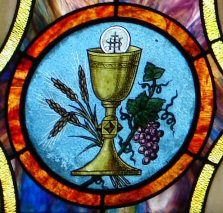 The Liturgy of the Eucharist
The Liturgy of the Eucharist
Gifts of bread and wine symbolizing ourselves are presented to the priest who will offer them to God the Father. Through the Holy Spirit, they will become the Body and Blood of Jesus Christ whom we receive in Holy Communion. Jesus unites Himself with us for our spiritual nourishment and strength. Today, when individuals do not present their own personal offerings of bread and wine, the monetary contribution symbolizes the material of their united sacrifice. The priest makes and offering of the bread and wine to God.
Preparation of the Bread and Wine:
Priest: Blessed are you, Lord God of all creation,
for through your goodness we have received the bread we offer you:
fruit of the earth and work of human hands, it will become for us the bread of
life.
All:
Blessed be God for ever.
Priest: By
the mystery of this water and wine may we come to share in the divinity of
Christ, who humbled himself to
share
in our humanity.
Priest: Blessed are you, Lord God of all creation, for through your goodness we have
received the wine we offer you; fruit
of the vine and work of human hands it will become our spiritual drink.
All: Blessed be God for ever.
Priest: With
humble spirit and contrite heart may we be accepted by you, O Lord, and may our
sacrifice in your sight this
day be pleasing to you, Lord God.
The Priest's Hands are Washed: This act was traditionally necessary because the priest handled the various gifts presented by the people. Now, the cleansing act using water reminds the priest and ourselves of the need to cleanse not only the hands but the soul. Soon, the priest's hands will hold the actual body of Christ, and we will become His dwelling place.
Priest: Wash
me o Lord, from my iniquity and cleanse me from my sin.
Pray, brethren, that
my sacrifice and yours may be acceptable to God, the almighty Father.
All: May the Lord accept the sacrifice at your hands for the praise and glory of his
name, for our good and the good of
all his holy Church.
Prayer over the Gifts: Speaking in our name, the priest asks the Father to accept the gifts we offer through him.
Priest: We place before you with joy these offerings, which bring eternal remedy, O Lord, praying that we may both faithfully revere them and present them to you, as is fitting, for the salvation of all the world. Through Christ our Lord.
Eucharistic Prayer: (Number Four: The priest may select from several forms).
Priest: The Lord be with you.
All: And with your
spirit.
Priest: Lift up your hearts.
All: We lift them up to the Lord.
Priest: Let us give thanks to the Lord, our God.
All: It is right
and just.
Preface Prayer:
Priest: It is truly right and just, our duty and our salvation, always and everywhere to give you thanks, Lord, holy Father, almighty and eternal God through Christ our Lord. By the mystery of the Incarnation, he has led the human race that walked in darkness into the radiance of the faith and has brought those born in slavery to ancient sin through the waters of regeneration to make them your adopted children. Therefore, all creatures of heaven and earth sing a new song in adoration, and we, with all the host of Angels, cry out, and without end acclaim:
Acclamation:
Priest
and All:
Holy, Holy, Holy Lord, God of hosts. Heaven and
earth are full of your glory. Hosanna in the highest.
Blessed
is he who comes
in the name of the Lord. Hosanna in the highest.
Priest: We give you praise, Father most holy, for you are great and you have fashioned all your works in wisdom and in love. You formed man in your own image and entrusted the whole world to his care, so that in serving you alone, the Creator, he might have dominion over all creatures. And when through disobedience he had lost your friendship, you did not abandon him to the domain of death. For you came in mercy to the aid of all, so that those who seek might find you. Time and again you offered them covenants and through the prophets taught them to look forward to salvation.
And you so loved the world, Father most holy, that in the fullness of time you sent your Only Begotten Son to be our Savior. Made incarnate by the Holy Spirit and born of the virgin Mary, he shared our human nature in all things but sin. To the poor he proclaimed the good news of salvation, to prisoners, freedom, and to the sorrowful of heart, joy. To accomplish your plan, he gave himself up to death, and, rising from the dead, he destroyed death and restored life.
And that we might live no longer for ourselves but for him who died and rose again for us, he sent the Holy Spirit from you, Father, as the first fruits for those who believe, so that, bringing to perfection his work in the world, he might sanctify creation to the full.
Priest: Therefore, O Lord, we pray: may this same Holy Spirit graciously sanctify these offerings, that they may become the Body and Blood of our Lord Jesus Christ for the celebration of this great mystery, which he himself left us as an eternal covenant.
The priest repeats the words which Christ used at his Last Supper when He changed the bread into His Body and the wine into His Blood. His Body and Blood are truly present but under the appearance of bread and wine. The death of Christ is prolonged in each of those who receive Him worthily. We apply His death to ourselves so that we may share His glory. This moment is the most solemn on earth because it is Divine act which enables us to apply to ourselves the Cross which Christ willingly took upon Himself.
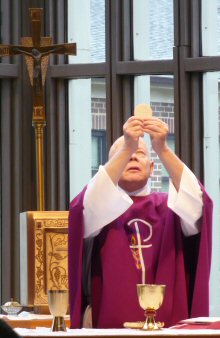 We
are called to die to sin and lift our very selves to God so that we become
changed; to do as God would have us do, to become what God would have us become. Our own little cross
can lift us into union with Christ's Cross so we may earn the joys of
everlasting happiness with God the Father.
We
are called to die to sin and lift our very selves to God so that we become
changed; to do as God would have us do, to become what God would have us become. Our own little cross
can lift us into union with Christ's Cross so we may earn the joys of
everlasting happiness with God the Father.
The
Lord's Supper:
For when the hour had come for him
to be glorified by you, Father most holy, having loved his own who were in the
world, he loved them to the end: and while they were at supper, he took bread,
blessed and broke it, and gave it to his disciples, saying:
Take this, all of you and eat of it: this is my Body which will be given up for you.
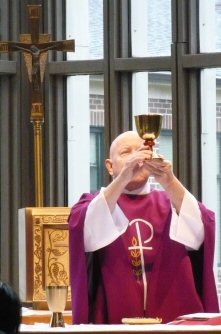 In a similar way, taking the chalice filled with the fruit of the vine, he
gave thanks, and gave the chalice to his disciples, saying:
In a similar way, taking the chalice filled with the fruit of the vine, he
gave thanks, and gave the chalice to his disciples, saying:
Take this, all of you, and drink from
it; for this is the chalice of my Blood, the Blood of the new and eternal
covenant, which will be poured out for you and for many for the forgiveness of
sins. Do this in memory of me.
Memorial Acclamation: (The priest may select from several forms).
Priest: The
mystery of faith.
Priest
/ All: Save us,
Savior of the world, for by your Cross and Resurrection you have set us free.
Memorial Prayer: (The priest may select from several forms).
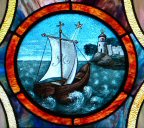 Priest:
Priest:
Recalls Christ's Passion, Resurrection, Ascension, the Church,
the dead, and ourselves.
Therefore, O Lord, as we celebrate the memorial of our redemption, we
remember Christ's Death and his descent to the realm of the dead, we proclaim
his resurrection and his Ascension to your right hand, and, as we await his
coming in glory, we offer you his Body and Blood, the sacrifice acceptable to
you which brings salvation to the whole world.
Look, O Lord, upon the Sacrifice which you yourself have provided for your Church, and grant in your loving kindness to all who partake of this one Bread and one Chalice that, gathered into one body by the Holy Spirit, they may truly become a living sacrifice in Christ to the praise of your glory.
Therefore, Lord, remember now all for whom we offer this sacrifice: especially your servant _____ our Pope, _____ our Bishop, and the whole Order of Bishops, all the clergy, those who take part in this offering, those gathered here before you, your entire people, and all who seek you with a sincere heart. Remember also those who have died in the peace of your Christ and all the dead, whose faith you alone have known.
To all of us, your children, grant, O
merciful Father, that we may enter into a heavenly inheritance with the Blessed
Virgin Mary, Mother of God, with blessed Joseph, her Spouse, and with your
Apostles and Saints in your kingdom. There, with the whole of creation,
freed from the corruption of sin and death, may we glorify you through Christ
our Lord, through whom you
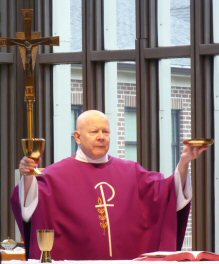 bestow
on the world all that is good.
bestow
on the world all that is good.
Doxology:
Prayer of Praise:
Through
him, with him, and in him, O God, almighty Father, in the unity of the Holy
Spirit, all glory and honor is yours, for ever and ever.
All: Amen.
Communion Rite
In the Liturgy of the Eucharist, we symbolically offer ourselves to the Lord through the gifts of bread and wine. At the Consecration, we offer our very lives to be united the God the Father through the Cross of Christ. In Communion, we find that we have not died at all, but have come to life. We have surrendered ourselves to God through His Divine Son, Jesus Christ. In return become ennobled and enriched. We give up time and we get eternity, we give up our sin and we receive grace, we surrender our self-will and receive the strength of the Divine Will, we give up ourselves and we receive everything. For the Son of God says to us that unless we receive Him we shall not have Divine life in us. But it is not really we who receive Christ as it is Christ who receives us, bringing us into Himself.
God makes His Cross the very means of our salvation and our life. While we have crucified Him, His eternal love cannot be extinguished. Christ willed to give us the very life we crucified in our Redemption, the Consecration of Holy Thursday into Communion, His death into our everlasting life.
The Lord's Prayer:
Priest: At
the Savior's command and formed by divine teaching, we dare to say:
Priest and
All: Our
Father, who art in heaven, hallowed be they name; Thy kingdom come; Thy will be
done on earth as it is in
heaven. Give us this
day our daily bread, and forgive us our trespasses, as we forgive those who
trespass against us; and lead us not into temptation, but deliver us from evil.
Priest: Deliver us, Lord, we pray, from every evil, graciously grant peace in our days, that, by the help of your mercy, we may be always free from sin and safe from all distress, as we await the blessed hope and the coming of our Savior, Jesus Christ.
All: For the kingdom, the power and the glory are yours now and forever.
Prayer for Peace:
Priest: Lord Jesus Christ, who said to your Apostles: Peace I leave
you, my peace I give you, look not on our sins, but on the faith of your Church,
and graciously grant her peace and unity in accordance with your will. Who
live and reign for ever and ever.
All: Amen.
Priest: The peace of the Lord be with
you always.
All: And with your spirit.
Priest: Let us offer each other the sign of peace.
Breaking of the Bread:
Priest: May this mingling of the Body and Blood of our Lord Jesus Christ bring eternal life to us who receive it.
Priest and All: Lamb of God, you take away the sins of the world,
have mercy on us.
Lamb of God, you take away the sins of the world, have mercy on us.
Lamb of God, you take away the sins of the world, grant us peace.
Priestly Preparation: Lord Jesus Christ, Son of the
living God, who, by the will of the Father and the work of the Holy Spirit,
through your Death gave life to the world, free me by this, your most holy Body
and Blood, from all my sins and from every evil; keep me always faithful to your
commandments, and never let me be parted from you.
All: Amen.
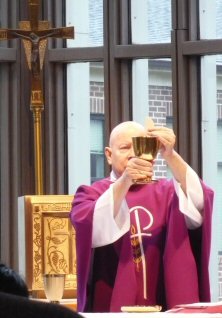
Priest: Behold
the Lamb of God, behold him who takes away the sins of the world. Blessed
are those called to the supper of the Lamb.
Priest and All: Lord,
I am not worthy that you should enter under my roof, but only say the word and
my soul shall be healed.
Priest: May the Body of Christ keep me safe for eternal life.
May the Blood of Christ keep me safe for eternal life.
Communion Antiphon
John 9:11, 38
The Lord anointed my eyes: I went, I washed, I saw and I believed in God.
Communion of the Faithful:
Priest:
The Body of Christ.
The Faithful: Amen.
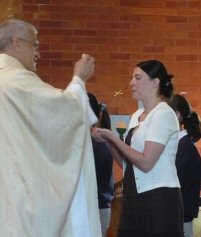
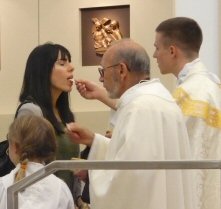
Priest/Deacon/
Extraordinary Eucharistic Minister:
The Blood of Christ.
The Faithful: Amen.
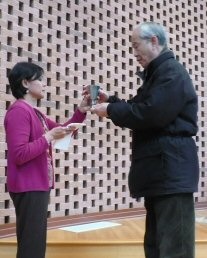
Cleansing of the Vessels:
Priest: What has passed our lips as food, O Lord, may we possess in purity of heart, that what has been given to us in time may be our healing for eternity.
Prayer after Communion:
Priest: Let us pray.
Priest: O God, who enlighten everyone who comes into this
world, illuminate our hearts, we pray, with the splendor of your grace, that we
may always ponder what is worthy and pleasing to your majesty and love you in
all sincerity. Through Christ our Lord.
All: Amen.
Concluding Rite
Priest: The Lord be with you.
All: And
with your spirit.
Priest: Bow
down for the blessing.
Dismissal Prayer: (The priest may select from several forms)
Priest: Look upon those who call to you, O Lord, and sustain the
weak; give life by your unfailing light to those who walk in the shadow of
death, and bring those rescued by your mercy from every evil to reach the
highest good. Through Christ our Lord.
All: Amen.
Priest: Go forth, the Mass in ended.
All: Thanks be to God.
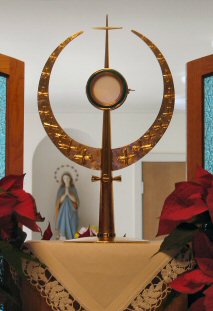 O my Jesus, forgive us our sins.
O my Jesus, forgive us our sins.
Save us from the fires of hell.
Lead all souls to heaven,
especially those in most need of your mercy.
www.Divinemasterplanforlife.com
www.Saintsnheaven.com